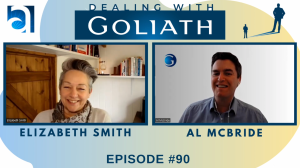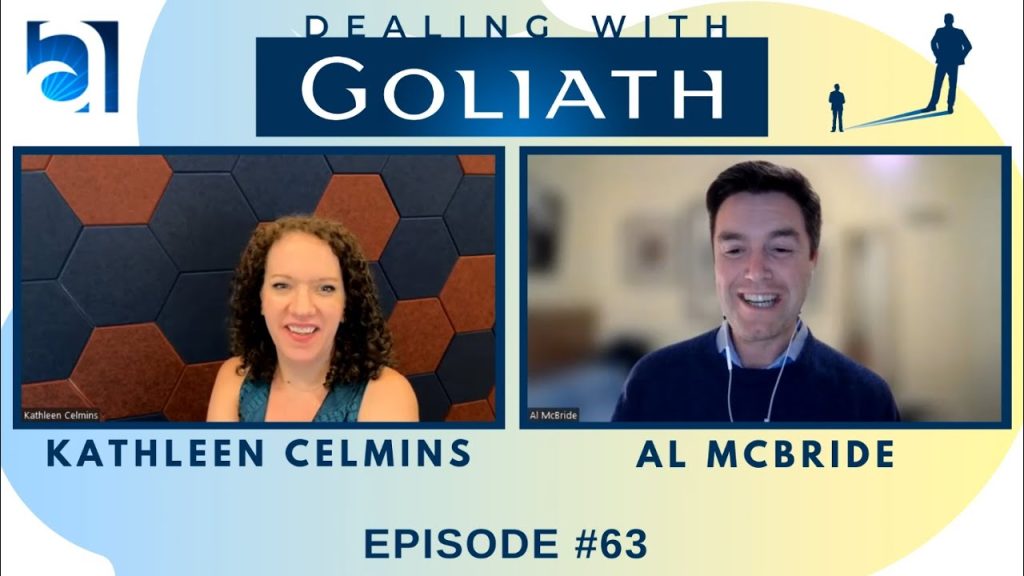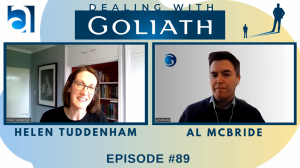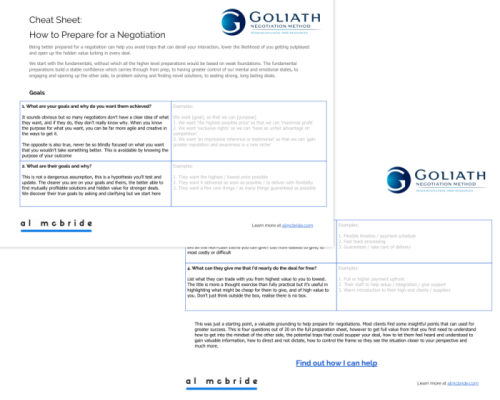

Discover $100k Revenue Stream You’ve Already Created in Your Business with Kathleen Celmins #063
Show Notes:
Kathleen Celmins is a desert-dwelling yogi who helps agency owners and service providers uncover a $100,000 revenue stream without having to create anything new.
Every business owner who has been working for at least a few years has $100,000 just sitting in their digital files, collecting digital dust. She helps them uncover those income streams, leverage their expertise, and package it properly.
Topics explored:
- This is a great way for service providers and designers to overcome income ceilings
- The problem of scaling your business
- 3 Brainstorming Questions to find that hidden gold, it’s often right under your nose
- Secret Sauce: know that if you create a recipe book, your restaurant will still be full, maybe more so
- The curse of the expert, look for the word ‘just’…
- Bigger budgets get cut on the done for you side, and that money goes into learning and development
Transcript
Al McBride 0:02
Welcome to the dealing with Goliath podcast. The mission of dealing with Goliath is to sharpen the psychological edge in negotiation, ethical influencing and high impact conversations for business leaders who want to be more effective under pressure, uncover hidden value, and build greater connection all while increasing profitability. With expert guests across the business spectrum. We deliver Gems of Wisdom delving into their methods, their thinking and approach to business life and problem solving. This is the short form espresso shot of insight podcast interview to boost business performance, using our five questions in a roundabout 15 minutes.
My guest today is Kathleen Salmond’s No, Kathleen is a desert dwelling yogi, who helps agency owners and service providers uncover $100,000 revenue stream without having to create anything new. Every business owner has been working for at least few years has 100 grand just sitting in their digital files, collecting digital dust, she helps them uncover those income streams, leverage their expertise, and package it properly. Why was there a scattering? Welcome to the show? That’s that’s certainly an impressive intro. You’ve, you’ve grabbed my attention as you did. I’m sure many of the listeners are hooked in immediately. So yeah, let’s start with that. So who’s your ideal client? And what’s the biggest challenge that they face?
Kathleen Celmins 1:36
It’s the people that benefit the most from what I’ve put together, our service providers, their writers, or designers, or I think, because I have a background in marketing, I attract marketers. It’s funny how that works. So they’re, they’re offering services in a digital space. And they bump up against income ceilings, right? Like, you get to the point where you’re booked out several months in advance, and you can’t scale, you can’t, you can’t just double the number of hours you’re working, although so many of us try, right?
Like I don’t know, who needs sleep or family time, you know, you can’t really double your rate your app market rate. And, you know, maybe you should, maybe you should raise your prices, but then your pipeline dries completely up, and you have to deal with another level of of salesmanship, and maybe you’re not ready for that. So the option, the option that I see is adding leverage, and digital products are a really great way to add a leveraged source of income.
Al McBride 2:48
So, so what are some of the common mistakes people make when they’re trying to solve that problem? So as you said, they’re usually stuck in this cycle where they’re booked up all going well. And as we said, they can’t quite scale, they can’t quite raise their rent their rates by all that much. So is this a problem that they’re even or an opportunity they’re even aware of at all? Or where is their thinking at?
Kathleen Celmins 3:12
Yeah, well, some of them aren’t. Some of them think that they don’t have to like, how, if you’re, if you’re maxed out, how could you possibly carve out time for this? Right? Exactly. Or it’s like, they’re they, they just don’t know that it could work for them. Or they’re the service provider who is used to being the person who wears all of the hats, all of the shoes, all of that. And they say they get this idea, right?
They’re listening to this right now. And they’re like, great, so I’m going to spend the next six months coming up with a product, and they spend all their time on that. And they go down a rabbit hole. For some reason, they forget to ask anybody if they would buy it, they but they’ve got like, they’re, they’re, they’re focused. And let’s just say that, for example, they picked a topic that’s very similar to what they do for the they’re done for you.
So by the time they come up for air, their pipeline is dry, they don’t know where their next client is coming from. And they get to the point where they say, Well, forget it, I’m gonna go pitch myself the way that I’m accustomed to the way I know how to get clients, because I can’t trip over my next $10,000 project, but with this $1,000 course. And so they put on the shelf and they say they’re gonna get to it later. But then, you know, prospecting takes up all their time, and then actually fulfilling that client work takes up all their time. And before you know it, time has gone by, and that’s a great piece of a digital product that no one’s ever seen.
Al McBride 4:47
Okay, okay, so, it sounds like an awful lot of these, as you said that there’s, they have assets there that they’re not really utilizing. Is that a big part of it?
Kathleen Celmins 4:57
Yeah. And They get like if they’ve, if anybody listening here has has come up with their their own digital product, they hear themselves in this right? Like, they sent one lukewarm email to their list, they’re tired of it, they don’t really want to sell this thing. They really like it to just sell itself. Or they they haven’t even gone down that path because they know themselves, they know that they would just rabbit hole and do exactly what I just described. So, so there’s this, to me, it’s like this huge opportunity for every business owner to take a deep look at where they could add a leveraged income stream.
Al McBride 5:39
That’s outstanding. I’m sure you as I said, you’ve worked a lot of years there. Oh, tell me more. Tell me more so. So what is one valuable free action that the audience can implement that will help them along those lines? So it might solve it. But and you gave us a few hints? There are what sort of what what do you help them to move in the right trajectory?
Kathleen Celmins 5:58
Three brainstorming things first, are there? Have you had the same question asked by three different people who don’t know each other? How do you XYZ? And often, that’s, that’s something that you can just do quickly, and you’ve helped them. But it’s something that maybe it would have taken them six to 10 hours to do without knowing you. It is that? Have you been asked the same question three times, that’s easy for you to answer. So there’s some time the question I get asked a lot is how do you write emails?
And I just my answer is write emails. And so that’s not really like you can’t really build a digital product around that. But if you had, if somebody came to you, if you’ve gotten those questions, that’s a good, that’s a good place to jump jump from, because those three different unrelated people are validating the market for you. That gets you more clear on what you should build.
And then the other two areas that you can think about are teaching people how to do what you do your secret sauce, knowing full well that you’re building a cookbook, and that the restaurant will still be filled, if not more so filled by the publication of this cookbook. Or what could you if you’ve been in business a couple of years, what do you know now that if you’ve known at the get go would have saved you six 8 to 10 months?
Al McBride 7:32
Okay, that’s fun. Those are fascinating questions, as you said, which really open up the door? I’m thinking here myself. That’s a good guy. Exactly. Yeah. How are you gotten the cogs turning? So just just to go back through those. So just for a moment, so one of them is where what what would you be? What would you want to have known when you were starting out? So I love that. And that’s a fascinating area.
So what just on a counterbalance side, are things that you’d recommend clients to look further into versus maybe to, as you say, put on the shelf? So one of them was that, as you mentioned earlier, by way of example, that it’s something that you answer a lot, but you can answer fairly, skillfully or quite quickly. Are there any other sort of red flag green flag type areas for people to proceed out that?
Kathleen Celmins 8:24
That another? Yeah, another one is thinking about the things because everybody listening to this has a PhD level of expertise in their topic. And so the, the curse of the expert is that the more you know, the more you think everybody has the same knowledge as you. So if you’re teaching somebody something, what look for the word just, so if I had somebody say to me, you know, I’ve got this, I don’t know what I would do. I, the only thing I can think of, is I have, I just have this process, that onboards a new contractor in two weeks, with with no churn and no mistakes, as I said, just like that, well, it’s just a series of steps.
You know, it’s, it’s, it’s something anybody could do, and, but it isn’t something anybody does. So it’s those kinds of things that like that person was way too close to it. And you’re way too close to your expertise, too. So anything that you think of as like just ordinary course of business, could be something that can be turned into a digital product.
Al McBride 9:32
I love that. I love that so much because it goes along that lines is some of the best things that it’s one of the things that you are best at are things that you don’t even realize you’re best at. Yes. Because it’s so natural to you that you don’t even realize. Yeah, exactly. So a part of it sounds like as you said, you’re helping people find that asset there find, as you say, I love that phrase, their special sauce and I love the analogy used of the recipe.
He or the cookbook. As he said, it’s like the restaurant where the chef has the cookbook, it doesn’t stop people coming into the restaurant, in actual fact it does more often, because they will look at the recipe a little bit and go, Wow, I’m gonna go into the restaurant, because that’s a huge amount of hassle. And obviously, you’re the master at that. So that’s fantastic. So what might be one valuable free resource that you could direct people to that will help them move in that right direction?
Kathleen Celmins 10:31
You can download a case study, I have a case study about how I helped clients take go from idea to $100,000 in 12 months. That’s at the well paid expert.com/ 100k case study. I’m sure we can just link to that. Absolutely, of course. 100. Okay.
Al McBride 10:52
Excellent. Again, just just to whet our appetites, can you give us a few insights into that process? Is there anything you can give away to, just to whet our appetite, so we go read that.
Kathleen Celmins 11:04
That one was all webinar actually live webinars, the same live webinar done once a month, a couple like it was like there was like a webinar week. So they did three different times. So they could send paid traffic to one landing page and have people pick a time. The by the end of that year, the client said, I would like to physically burn this slide deck, because she had known it so well by the end, that she was just so sick of saying the same thing over and over again. But one of the reasons that it worked so well was because she knew it cold. She knew exactly where her inflection points were. And we do as entrepreneurs, we do ourselves a disservice by always wanting to do something new, without remembering that it’s all new for the person who’s listening to it for the first time.
Al McBride 11:58
Oh, true. So true. Absolutely. And so this is fascinating. So is there one question I should have asked you, that will be of great value for our audience.
Kathleen Celmins 12:11
Oh, you and you sent me this ahead of time, and I didn’t prep for it. And I thought, oh, I’ll just come up with it. But that’s tough.
Al McBride 12:18
That is a tough one. What is a common question you got? Yeah. Oh, sorry.
Kathleen Celmins 12:22
Yeah, I get I get a call. But one of the questions I get a lot. So let’s say let’s take for example, web design agency, and your you are your your let’s say it’s $10,000, you’re you have a $10,000 system, that that is branding and web design, right? A lot of times your hesitation right now is going to be I don’t want to teach that. Because if I teach them, they will not buy from me. And again, with the cookbook in the in the the fancy restaurant, if you’ve ever read a Thomas Keller cookbook, for example, you are not ever going to make anything he makes.
So the same sort of thing applies in, in business. So if you are working at a level, if somebody if your client has $10,000, they don’t have time, they just don’t, they’re going to give you that money 10 times over. If they don’t have $10,000, they might buy your course. So to me having that as a down sell in your back pocket means you’re at least recovering some of that money and teaching them how to do it themselves. And chances are some of those people will convert to clients down the line the high ticket clients downline anyway, as they got as they go in and just discover how much work it is. So don’t think don’t think of of this as something you can’t do.
If you have something high ticket that you’re you’re doing for people because the two things, the markets are different, there’s very little overlap between the people who want to eat fish and the people that want to learn how to fish. And too, as we get deeper and deeper into this recession, but bigger budgets get cut on the done for your side. And that money goes into learning and development.
So if you can capture that learning and development money you’re at and it’s leveraged. So you don’t you create it once you never have to serve like you never have to create individual logos for people down the line for the web design example. And then those are like two things to think about that. At How can you hedge again, how can you protect yourself against budget cuts and recession?
Al McBride 15:04
Like, absolutely, and I can vouch for that so much wisdom there. But you’re saying that, I love that, you know, often you think, Oh, well, if they buy the cheaper one, they won’t upgrade. But that’s not the case, as you said, if they have the 10k by way of example, they’re not going to want to do it themselves. Vice versa is the same. You know, if they have the time, but not the money, then they’re going to want to learn how to do it.
I can vouch for this one of my first businesses 15-20 years ago, I was actually 15 years ago, this was exactly that was teaching people how to use WordPress. But the amount of people that would buy the course and then say, this is more difficult than I thought. Can you actually build it for a infrastructures building half the websites for them? So it? Okay, it goes against that? Well, because a little bit with that idea that some of them will upgrade because they realize, oh, this is, you know, to go deeper? Yes. They get it, they get value from it. They get insight from some of it, they can do. But then as you said, if they want to move to the next level, though, you’re the person that I get to do it. That’s fun.
Kathleen Celmins 16:09
Exactly. And for anybody listening to this, who thinks that WordPress is confusing? I’m with you. It used to be so much worse.
Al McBride 16:18
Exactly. That’s why I stopped many years ago, like right now for this WordPress stuff. I still use it though. still use it, but don’t don’t go near it. Yeah, absolutely. Absolutely. Well, Kathleen, thank you so much for your time and so much for those fantastic insights. It’s fantastic idea. And as I said, we’ll check out that case study and everyone else should too. Inspiring stuff.
Kathleen Celmins 16:44
Thanks, everyone.
Al McBride 16:46
Cheers. Thank you.
Transcribed by https://otter.ai
Resources
Case Study of how Kathleen helped a client go from idea to $100,000 in 12 months: https://wellpaidexpert.com/100k
Kathleen’s Website: https://thewellpaidexpert.com
Kathleen’s 90 Day Quick Create
Connect with Kathleen
LinkedIn: https://linkedin.com/in/kathleencelmins
Ready for more:
If you’re interested in more, visit almcbride.com/minicourse for a free email minicourse on how to gain the psychological edge in your negotiations and critical conversations along with a helpful negotiation prep cheat sheet.


